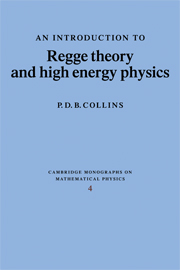Book contents
- Frontmatter
- Contents
- Preface
- 1 The scattering matrix
- 2 The complex angular-momentum plane
- 3 Some models containing Regge poles
- 4 Spin
- 5 Regge trajectories and resonances
- 6 Introduction
- 7 Duality
- 8 Regge cuts
- 9 Multi-Regge theory
- 10 Inclusive processes
- 11 Regge models for many-particle cross-sections
- 12 Regge poles, elementary particles and weak interactions
- Appendix A The Legendre functions
- Appendix B The rotation functions
- References
- Index
- Frontmatter
- Contents
- Preface
- 1 The scattering matrix
- 2 The complex angular-momentum plane
- 3 Some models containing Regge poles
- 4 Spin
- 5 Regge trajectories and resonances
- 6 Introduction
- 7 Duality
- 8 Regge cuts
- 9 Multi-Regge theory
- 10 Inclusive processes
- 11 Regge models for many-particle cross-sections
- 12 Regge poles, elementary particles and weak interactions
- Appendix A The Legendre functions
- Appendix B The rotation functions
- References
- Index
Summary
In 1959 Regge showed that, when discussing solutions of the Schroedinger equation for non-relativistic potential scattering, it is useful to regard the angular momentum, l, as a complex variable. He proved that for a wide class of potentials the only singularities of the scattering amplitude in the complex l plane were poles, now called ‘Regge poles’. If these poles occur for positive integer values of l they correspond to bound states or resonances, and they are also important for determining certain technical aspects of the dispersion properties of the amplitudes. But it soon became clear that his methods might also be applicable in high energy elementary particle physics, and it is in fact here that the theory of the complex angular momentum plane, usually called ‘Regge theory’ for short, is now most fruitfully employed.
Apart from the leptons (electron, muon and neutrinos) and the photon, all the very large number of elementary particles which have been found, baryons and mesons, enjoy the strong interaction (i.e. the nuclear force which inter alia binds nucleons into nuclei) as well as the less forceful electromagnetic, weak and gravitational interactions. Such particles are called ‘hadrons’, from the Greek ὰδρός meaning large. Some are stable, but most are highly unstable and decay rapidly into other hadrons and leptons.
- Type
- Chapter
- Information
- An Introduction to Regge Theory and High Energy Physics , pp. ix - xivPublisher: Cambridge University PressPrint publication year: 1977

